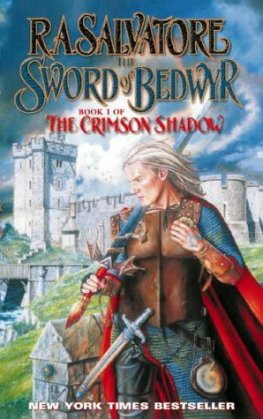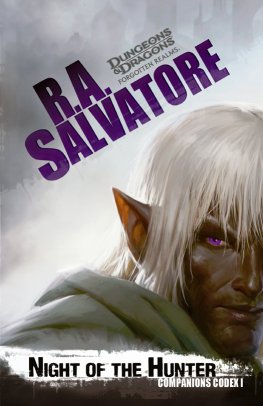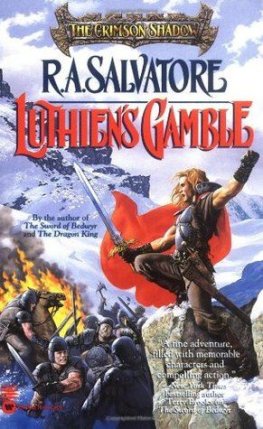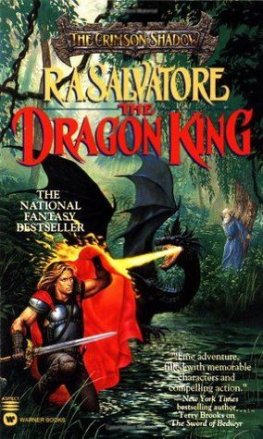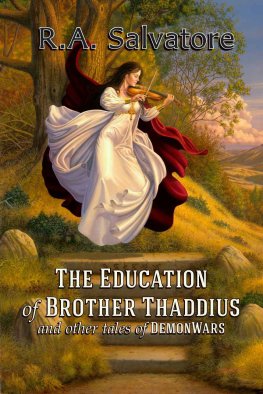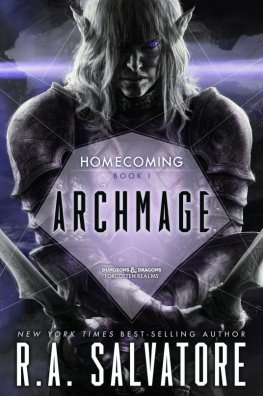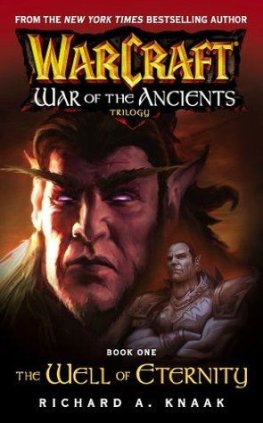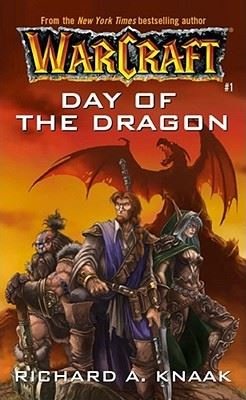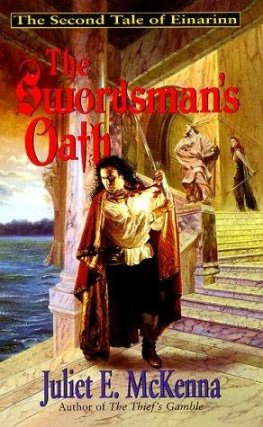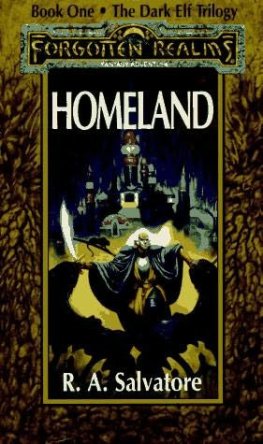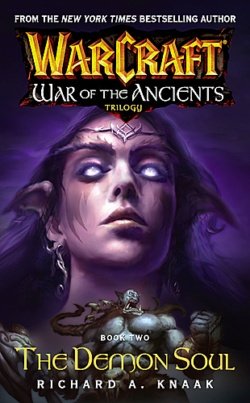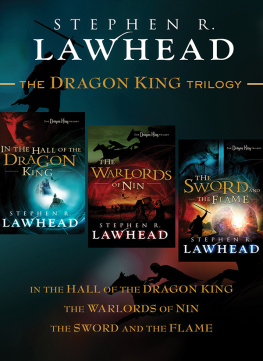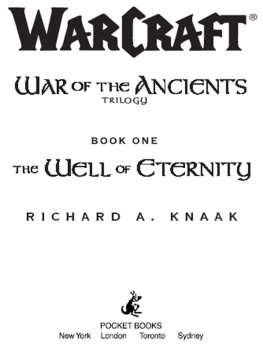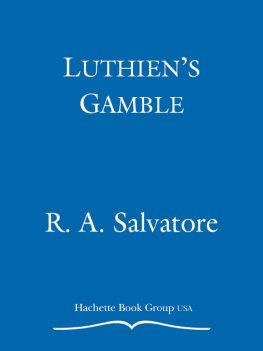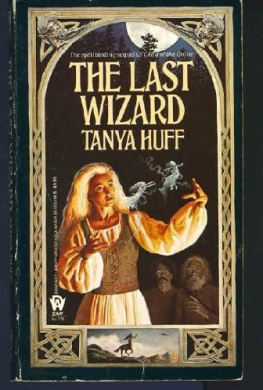R. A. Salvatore
The Sword of Bedwyr
To Betsy Mitchell, for all of her support and input, for showing me new potential and new directions. Enthusiasm truly is infectious.
And a special thank you to Wayne Chang, Donald Puckey, and Nancy Hanger. In a business as tough and competitive as this, its comforting to be working with such talented and dedicated people.
These are the Avonsea Islands, rugged peaks and rolling hills, gentle rains and fierce winds blowing down from the glaciers across the Dorsal Sea. They are quiet Baranduine, land of folk and Fairborn, land of green and rainbows. They are the Five Sentinels, the Windbreakers, barren peaks, huge, horned sheep, and multicolored lichen that grows eerily when the sun has set. Let all seafarers beware the rocks of the channels near to the five!
They are Praetoria, most populous and civilized of the islands, where trade with the mainland is the way and cities dot the countryside.
And they are Eriador, untamed. She is a land of war, of hardy folk as familiar with sword as with plow. A land of clans, where loyalties run as deep as blood and to fight a man is to fight all his kin.
Eriador, untamed. Where the clouds hang low over rolling hills thick with green and the wind blows chill, even in the height of summer. Where the Fairborn, the elves, dance atop secret hills and rugged dwarves forge weapons that will inevitably taste of an enemys blood within a year.
The tales of barbarian raiders, the Huegoths, are long indeed, and many are the influences of that warlike people on the folk of Eriador. But never did the Huegoths hold the land, never did they enslave the folk of Eriador. It is said among the clans of both Eriador and the barbarian islands that one Eriadoran was killed for every slain Huegoth, a score that no other civilized people could claim against the mighty barbarians.
Down from the holes of the Iron Cross came the cyclopians, one-eyed brutes, savage and merciless. They swept across the land, burning and pillaging, murdering any who could not escape the thunder of their charge. And there arose in Eriador a leader among the clans, Bruce MacDonald, the Unifier, who brought together the men and women of the land and turned the tide of war. And when the western fields were clear, it is said that Bruce MacDonald himself carved a swath through the northern leg of the Iron Cross so that his armies could roll into the eastern lands and crush the cyclopians.
That was six hundred years ago.
From the sea came the armies of Gascony, vast kingdom south of the islands. And so Avon, the land that was Elkinador, was conquered and civilized. But never did the Gascons claim rule of Eriador in the north. The great swells and breakers of the Dorsal Sea swept one fleet aground, smashing the wooden ships to driftwood, and the great whales destroyed another fleet. Behind the rallying cries of Bruce MacDonald! their hero of old, did the folk of Eriador battle every inch for their precious land. So fierce was their resistance that the Gascons not only retreated but built a wall to seal off the northern lands, lands the Gascons finally declared untamable.
And with Eriadors continued resistance, and with war brewing among some of the other southern lands, the Gascons eventually lost interest in the islands and departed. Their legacy remains in the language and religion and dress of the people of Avon, but not in Eriador, not in the untamable land, where the religion is older than Gascony and where loyalty runs as deep as blood.
That was three hundred years ago.
There arose in Avon, in Carlisle on the River Stratton, a wizard-king of great power who would see all the islands under his rule. Greensparrow was his name, is his name, a fierce man of high ambition and evil means. And evil was the pact that Greensparrow signed with Cresis who ruled the cyclopians, appointing Cresis as his first duke and bringing the warlike one-eyes into Greensparrows army. Avon became his in a fortnight, all opposition crushed, and then did he turn his sights on Eriador. His armies fared no better than the barbarians, than the cyclopians, than the Gascons.
But then there swept across Eriador a darkness that no sword could cut, that no courage could chase away: a plague that whispers hinted was inspired by black sorcery. None in Avon felt its ravages, but in all of free Eriador, mainland and islands, two of every three perished, and two of every three who lived were rendered too weak to do battle.
Thus did Greensparrow gain his rule, imposing a truce that gave unto him all the lands north of the Iron Cross. He appointed his eighth duke in the mining city of Montfort, which had been called Caer MacDonald, in honor of the Unifier.
Dark times there were in Eriador; the Fairborn retreated and the dwarves were enslaved.
That was twenty years ago. That was when Luthien Bedwyr was born.
This is his tale.
Ethan Bedwyr, eldest son of the Eorl of Bedwydrin, stood tall on the balcony of the great house in Dun Varna, watching as the two-masted, black-sailed ship lazily glided into the harbor. The proud man wore a frown even before the expected standard, crossed open palms above a bloodshot eye, came into view. Only ships of the king or the barbarians to the northeast would sail openly upon the dark and cold waters of the Dorsal Sea, so named for the eerie black fins of the flesh-eating whales that roamed the waters in ravenous packs, and barbarians did not sail alone.
A second standarda strong arm, bent at the elbow and holding a miners picksoon appeared.
Visitors? came a question from behind.
Recognizing the voice as his fathers, Ethan did not turn. Flying the duke of Montforts pennant, he answered, and his disdain was obvious.
Gahris Bedwyr moved to the balcony beside his son and Ethan winced when he looked upon the man, who appeared proud and strong, as Ethan distantly remembered him. With the light of the rising sun in his face, Gahriss cinnamon eyes shone brightly, and the stiff ocean breeze blew his thick shock of silvery white hair back from his ruddy, creased face, a face that had weathered under the sun during countless hours in small fishing craft out on the dangerous Dorsal. Gahris was as tall as Ethan, and that was taller than most men on Isle Bedwydrin, who in turn were taller than most other men of the kingdom. His shoulders remained broader than his belly, and his arms were corded from a youth spent in tireless work.
But as the black-sailed ship drifted closer to the docks, the coarse shouts of the brutish cyclopian crew urging the islanders into subservient action, Gahriss eyes betrayed his apparent stature.
Ethan turned his gaze back to the harbor, having no desire to look upon his broken father.
It is the dukes cousin, I believe, Gahris remarked. I had heard that he was touring the northern isles on holiday. Ah well, we must see to his pleasures. Gahris turned as if to leave, then stopped, seeing that stubborn Ethan had not loosed his grip on the balcony rail.
Will you fight in the arena for the pleasure of our guest? he asked, already knowing the answer.
Only if the dukes cousin is my opponent, Ethan replied in all seriousness, and the fight is to the death.
You must learn to accept what is, Gahris Bedwyr chided.
Ethan turned an angry gaze on him, a look that might have been Gahriss own a quarter of a century before, before independent Eriador had fallen under the iron rule of King Greensparrow of Avon. It took the elder Bedwyr a long moment to compose himself, to remind himself of all that he and his people stood to lose. Things were not so bad for the folk of Bedwydrin, or for those on any of the isles. Greensparrow was mostly concerned with those lands in Avon proper, south of the mountains called the Iron Cross, and though Morkney, the duke of Montfort, had exacted rigid control over the folk of the Eriadoran mainland, he left the islanders fairly aloneas long as he received his tithes and his emissaries were granted proper treatment whenever they happened onto one of the isles.

